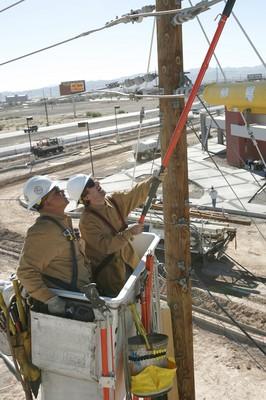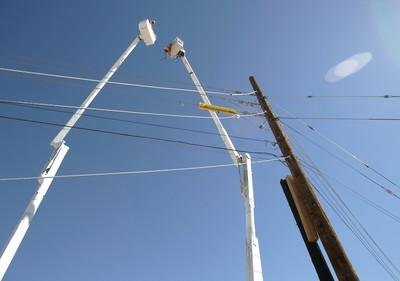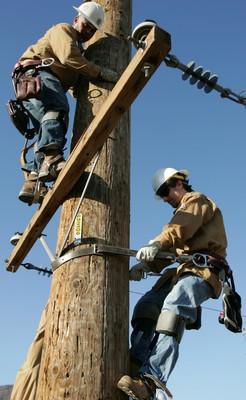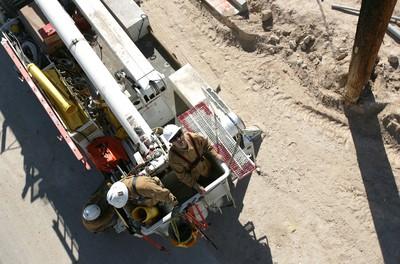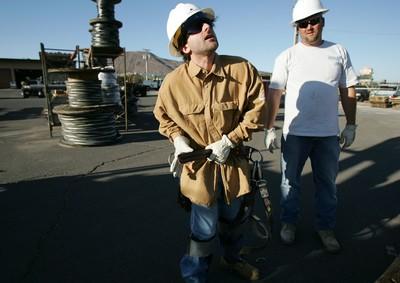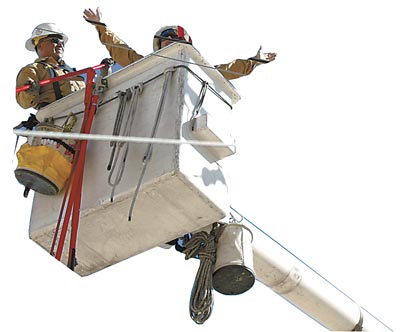High Wire Act (Lineman)
Carpet shocks test my coping skills. Yet here I am, about to touch an aluminum wire humming with 12,470 volts of electricity. The barrier between me and certain, instantaneous death is a 6-foot orange stick.
As a lineman for Nevada Power Co., it's my job to attach a clamp, called a stirrup, to a live power line. This will hold a place for a wire to be run to a new Motorcycle City franchise.
"OK, clamp it right there," says lineman Rogelio Gaerlan, 43, as we hover 50 feet above Boulder Highway and Emerald Avenue in a cherry picker.
I remember curiously inserting my index finger into a light socket when I was 4 years old. (That explains a lot about me, I know.)
"This is not like that," foreman Dave Geskes told me earlier. "This will kill you. It will actually blow you apart."
For every 100,000 employed in the United States, 34.9 linemen died on the job last year, according to the Bureau of Labor and Statistics. That's more than police patrol officers (16.8) and firefighters (16.6) combined.
"Once you see the big ball of fire that happens, you learn to respect it," said Gaerlan, who witnessed one wire fall atop another while working the grid in his native San Diego.
"You can't react," he said. "It just happens so quick, all you can do is feel that heat."
As my "hot stick" connects, it sizzles like freshly watered sauna rocks. Talk about high tension.
I'm protected, of course -- at least as much as possible. All Nevada Power linemen are harnessed onto their cherry pickers' boom arms and wear what's called a hot shirt. It's made of Nomex, which won't catch fire or melt (so if my body bursts into flames, they'll at least be able to save $120 by handing my shirt to the next guy).
And, of course, our hot sticks, constructed of fiberglass, don't conduct electricity.
Yet plenty of bad things still lie within possibility's realm. Last year, two Nevada Power linemen were thrown from a failing bucket and hung by their harnesses from the boom arm. And, two weeks ago, a live wire fell onto a bucket and sizzled until technicians could power it off.
Neither incident resulted in injuries. But 11 years ago, Nevada Power lineman Jay Skelton was killed after accidentally touching a 7,200 volt conductor.
"It went into his chest, through his heart and came out his elbow," Geskes said, adding that "mistakes happen."
Lineman Gary Peck said that Skelton was lucky.
"You want it to pass through your heart and just kill you," he said. "You don't want to live, because your soft tissue on the inside will all be burned up."
Gaerlan has to deal with this risk every day -- along with his wife, four children and one grandchild.
"We accept it," he says, before quickly falling silent about the subject -- as linemen tend to do.
This wasn't the career Gaerlan says he dreamt of as a kid. But he says he likes the pay. (He earns $37 an hour and works 60 hours a week, 20 of which are overtime.)
"My wife's dad did it," Gaerlan says, explaining how he landed his first job in the industry. "So I tried it and liked it."
The stirrup is in place. Now I have to hammer it in with another type of stick.
"Hit it hard!" Gaerlan screams.
This new stick is called an ampac gun, because it actually carries a .22 caliber bullet. When hammered, the bullet fires into a gap in the stirrup, to hold it in place. At least, that's what's supposed to happen.
"Harder!" Gaerlan screams.
I'm tapping too lightly because I'm scared. My mother always told me not to play with electricity.
"He's in the major leagues playing T-ball!" someone shouts from the ground. (I'm not sure who the voice belongs to, but apprentice Dave Rubel is a prime suspect. He has to train for three more years before even being allowed to do what I'm doing, so he can't be too happy for me.)
"Hit it harder, Sally!" the voice screams again.
Nevada Power invited me up here to show readers how hard a lineman's job is.
"When people call because their electricity is out, they don't understand what it takes to restore power," Geskes said. "They think we can go turn a light switch on."
Approximately 160 Nevada Power linemen (and 100 outside contractors) work to ensure that the 4,500 megawatts of power pulled per summer day by the valley's 1.8 million residents travels to them as smoothly as possible. But linemen are not being hired in step with the increase in demand for them.
"It's hard to find people for this job," Geskes said. "It's a dying breed. People don't want to do our trade. It's too physical, too dangerous."
The casing on the bullet is dented. My hammering was so light, the charge is ruined and won't fire. Gaerlan retrieves my stick and inserts a new shell.
"You messed it all up," Gaerlan says.
And this is among this job's easier tasks. When telephone poles beckon from backyards, out of cherry picker range, linemen must perform all operations after shimmying skyward -- with their gear -- using only steel shoe spikes, a pole-hugging belt and the power provided by their nervous system. (Some poles, such as the ones that power microwave dishes on mountaintops, can only be helicoptered onto. Nevada Power farms out those jobs.)
Applause erupts from below. After several tries, I finally succeed. The stirrup is secure. By tomorrow, Motorcycle City will be fully revved up.
The applause soon is drowned out by screams, however -- mine, as Gaerlan extends the boom, at full speed, to its maximum height of 75 feet. (Gaerlan was apparently the guy who spun the Tilt-A-Whirl even faster when his nauseous dates complained.)
"He told me he don't like heights!" Gaerlan yells down to his co-workers, who then chant "Higher, higher!"
At full extension, while I cower on my knees inside the bucket, Gaerlan spins the boom on its axis.
"Why did you have to go and tell me that?" Gaerlan asks me.
Mom, you were right about not playing with electricity.
Watch video of Levitan as a lineman at www.reviewjournal.com/video/fearandloafing.html. Fear and Loafing runs Mondays in the Living section. Levitan's previous adventures are posted at fearandloafing.com.
COREY LEVITANFEAR AND LOAFING
VIDEO
watch video



